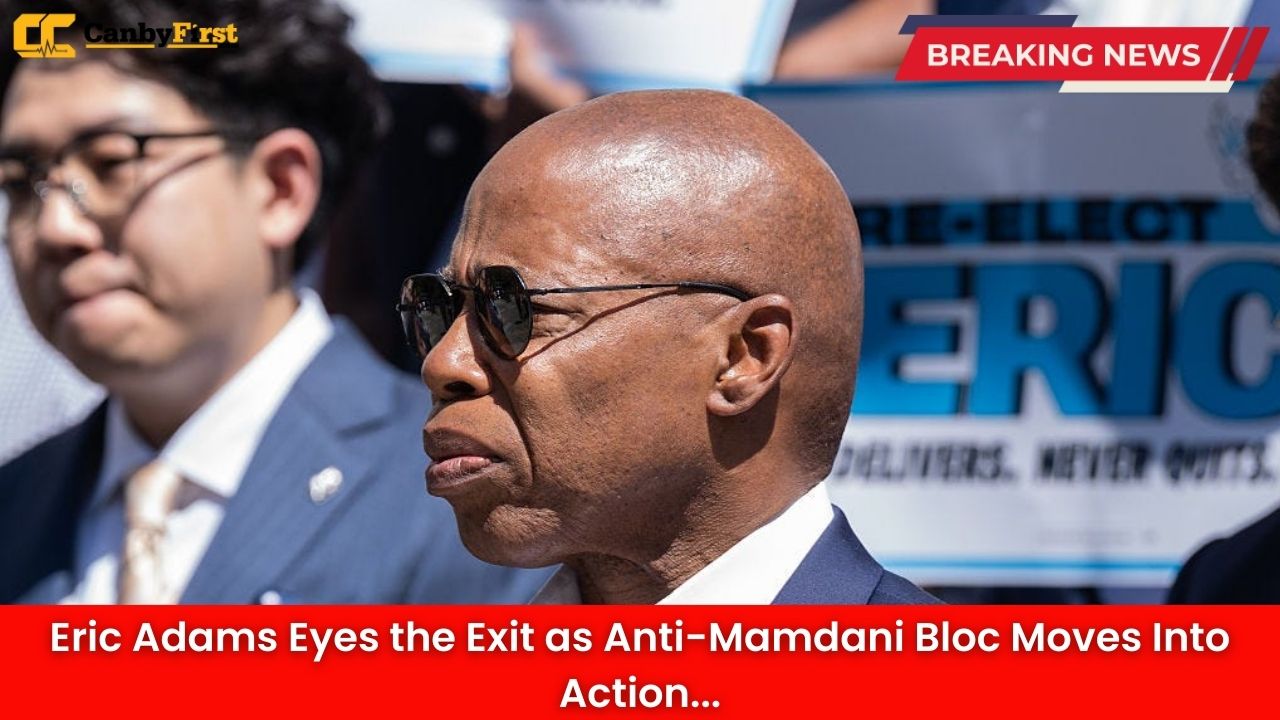Mayor Eric Adams’ political future in New York City appears increasingly uncertain as murmurs of an early exit from City Hall grow louder. Once seen as a confident law-and-order Democrat with a flair for commanding headlines, Adams now faces mounting scrutiny, dwindling approval ratings, and a persistent drumbeat of scandals that have weakened his grip on power.
Behind the scenes, conversations among Democratic power brokers suggest the mayor may not finish his term, a rare prospect in New York politics. While Adams himself has not directly announced plans to step aside, allies and critics alike are beginning to prepare for what many see as an inevitable transition.
Organizing Against Mamdani
Amid Adams’ political uncertainty, a clearer power struggle is emerging: an organized effort to stop Assemblymember Zohran Mamdani’s rise within New York’s progressive left. Mamdani, a democratic socialist representing Queens, has gained momentum in recent years with outspoken critiques of corporate influence, housing policy, and foreign policy positions that challenge the Democratic establishment.
Also Read
But while Mamdani has built energy among younger and left-leaning voters, a counter-effort is forming among the city’s traditional Democratic players—donors, labor leaders, and political operatives skeptical of the socialist wing’s influence. These forces, often described as “anti-Mamdani,” are angling to reassert establishment control while the mayor’s vulnerability leaves a power vacuum.
The Establishment Recalibrates
For decades, the city’s Democratic Party machine thrived on predictability, favor-trading, and tight control of endorsements. But since 2018, a wave of progressives has eroded their dominance, ousting long-standing incumbents and challenging once-powerful local bosses. With Mamdani’s growing public profile, establishment leaders fear another destabilizing cycle.
“The fear isn’t just about Mamdani,” one strategist explained privately, “it’s about what he represents—if the left takes even more ground, the donors and unions lose leverage.”
The exit rumors around Adams, combined with the organizing strength of Mamdani’s camp, have accelerated these behind-the-scenes calculations. With the 2025 elections on the horizon, and citywide races likely to realign alliances, the anti-Mamdani bloc is working earlier and more aggressively than usual.
Adams’ Dilemma
For Adams, who came into office as the “get-stuff-done” mayor, resignation or early retirement would mark a stunning fall from grace. His administration has been tested by federal investigations, budget disputes, and clashes with advocates over public safety and migrant crisis management. The result: a mayor who has burned through political capital faster than expected.
Those close to Adams note that the daily grind of defending policies, navigating investigations, and staving off criticism has taken a personal toll. Quiet conversations in City Hall hint at a mayor who feels increasingly cornered, weighed down by scandal and expectations.
Still, Adams maintains public defiance. In speeches and interviews, he emphasizes his achievements on crime reduction and public works, projecting confidence even as rivals sharpen their knives.
What’s at Stake
The stakes of the unfolding drama are significant. If Adams were to leave office early, city governance could be thrown into upheaval, with potential interim leadership scrambling to stabilize operations. Simultaneously, the anti-Mamdani bloc’s organizing signals that establishment Democrats see the next cycle as a make-or-break moment to reestablish dominance.
For Mamdani and other progressives, this is both a challenge and an opportunity. The pushback affirms their growing power, but also means the stakes—and the resistance—are higher than ever. Should they weather the establishment’s counter-move, New York politics could tilt further left in the years ahead.
Looking Ahead
As autumn politics in New York heat up, the twin narratives of Adams’ uncertain future and the anti-Mamdani flank are set to define the city’s political landscape. Will Adams remain, fight through the storms, and finish his term? Or is City Hall already preparing for a transition few expected so soon?
Meanwhile, Mamdani’s prominence ensures that his vision—and his critics—will dominate the debate regardless of what happens with Adams. One thing is clear: the era of predictable power in New York City Democratic politics has ended, and the next chapter promises even more turmoil, rivalry, and reshuffling of political loyalties.












